Where Do Potent P2Y12 Inhibitors Fit Into Current Practice? - Stroke Prevention
Published: 27 February 2023
-
Views:
 9561
9561
-
Likes:
 7
7
-
Views:
 9561
9561
-
Likes:
 7
7
-
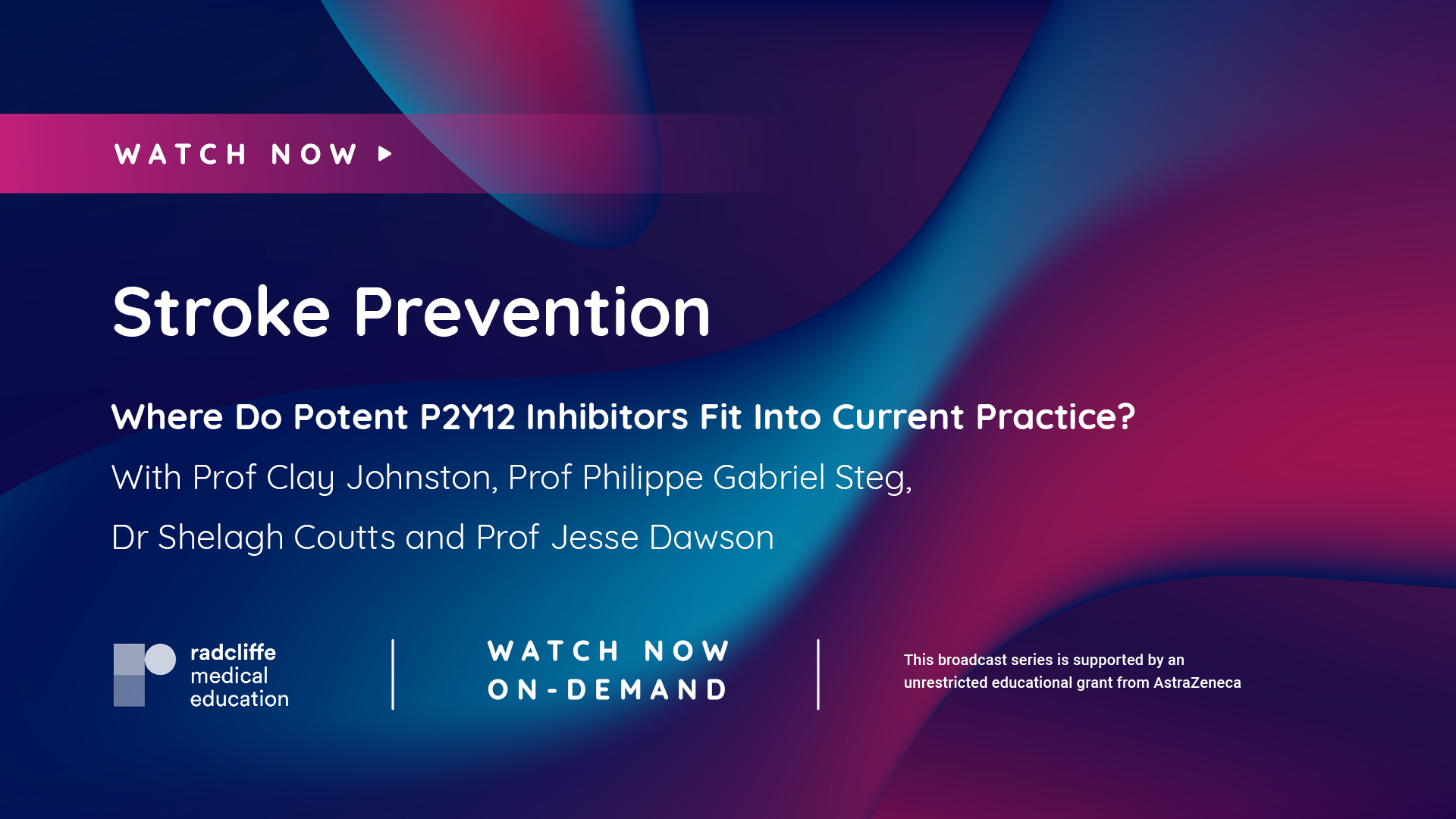 19m 16sPart 1 Potent Antiplatelets in Secondary Stroke Prevention: Where Do They Fit In? Clay Johnston
19m 16sPart 1 Potent Antiplatelets in Secondary Stroke Prevention: Where Do They Fit In? Clay Johnston
-
 15m 10sPart 2 Potent P2Y12 Inhibitors in Large Artery Atherosclerosis: Which Patients Benefit? Shelagh B. Coutts
15m 10sPart 2 Potent P2Y12 Inhibitors in Large Artery Atherosclerosis: Which Patients Benefit? Shelagh B. Coutts
-
 10m 34sPart 3 Risk Stratification in Secondary Stroke Prevention Jesse Dawson
10m 34sPart 3 Risk Stratification in Secondary Stroke Prevention Jesse Dawson
-
 12m 17sPart 4 Balancing Ischaemic and Bleeding Risk: Insights From Cardiology Philippe Gabriel Steg
12m 17sPart 4 Balancing Ischaemic and Bleeding Risk: Insights From Cardiology Philippe Gabriel Steg
-
 17m 6sPart 5 | Session 1 Case Studies
17m 6sPart 5 | Session 1 Case Studies
Overview
This broadcast series 'Where Do Potent P2Y12 Inhibitors Fit Into Current Practice?' will reappraise potent P2Y12 inhibitors, as evidence accumulates to support their broader use. At this juncture, there is still some uncertainty around patient selection, initiation and long-term management.
The fourth, and final, broadcast in this series, focused on Stroke Prevention. In this on-demand version of the live broadcast, Radcliffe Medical Education bring together a global faculty of experts in the field to look at current guidance, the landmark data, gaps in evidence and seek to provide practical guidance.
Prof Clay Johnston (Harbor Health, Texas, US) chairs the proceedings, and is joined by Prof Philippe Gabriel Steg (Hospital Bichat-Claude Bernard, Paris, FR), Dr Shelagh Coutts (University of Calgary, CA) and Prof Jesse Dawson (University of Glasgow, UK) for a series of insightful presentations and discussions.
You can also catch up on previous broadcasts in this series:
Key Learning Objectives
- Recall recent trial data for antiplatelet therapies in secondary stroke prevention
- Apply clinical judgement and trial data to develop optimal antiplatelet strategies in noncardioembolic stroke and TIA
- Use guidance and recent trial data to formulate optimal antiplatelet strategies in large artery atherosclerosis
- Confidently prescribe potent antiplatelet therapies by balancing ischaemic and bleeding risk
Target Audience
- Neurologists
- General Cardiologists
- Interventional Cardiologists
More from this programme
Part 1
Potent Antiplatelets in Secondary Stroke Prevention: Where Do They Fit In?
Prof Clay Johnston provides an overview of the current guidance around the use of antiplatelet therapy in secondary stroke prevention.
Part 2
Potent P2Y12 Inhibitors in Large Artery Atherosclerosis: Which Patients Benefit?
Dr Shelagh Coutts focuses on large artery atherosclerosis and the clinical evidence behind potent P2Y12 inhibitors in this population.
Part 3
Risk Stratification in Secondary Stroke Prevention
Prof Jesse Dawson discusses the impact of genetics and race on outcomes, assessing the current requirement for genetic testing in specific patients.
Part 4
Balancing Ischaemic and Bleeding Risk: Insights From Cardiology
Prof Philippe Gabriel Steg provides insight into balancing risk through the eyes of a cardiologist.
Part 5
Antiplatelet Strategies in Non-cardioembolic Ischaemic Stroke & TIA
Prof Jesse Dawson and Dr Shelagh Coutts each present a patient. Following this, the panel discuss treatment strategies for both, as well as answering audience questions.
Faculty Biographies
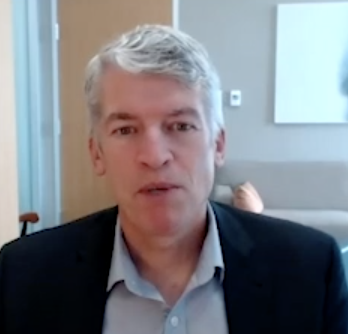
Clay Johnston
Prof Clay Johnston is Co-Founder and Chief Medical Officer at Harbor Health, Texas, US.
Previously, Prof Johnston was the inaugural Dean of The University of Texas at Austin Dell Medical School where he strived to advance a new model of better health care. He also served as a Professor of Neurology at the University of Texas at Austin and an Adjunct Professor of Neurology at the University of California, San Francisco. During his time at the University of California, Prof Johnston was Founding Director of the Center for Healthcare Value and was Associate Vice Chancellor of Research. Most of his research focuses on stroke care.
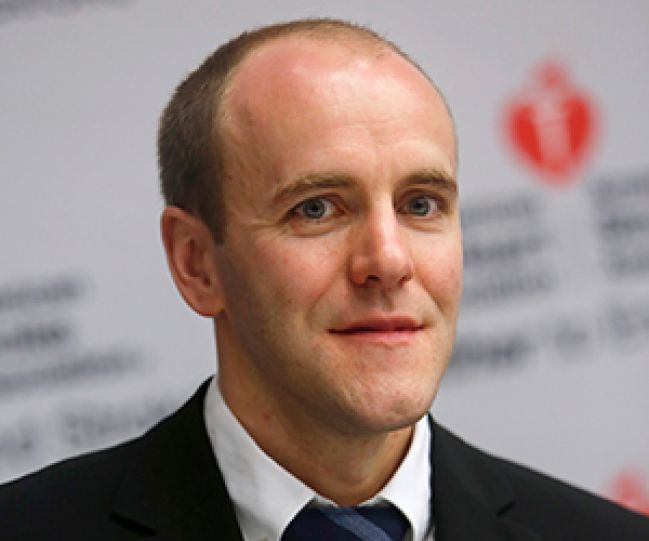
Jesse Dawson
Professor of Stroke Medicine and Consultant Physician
Prof Jesse Dawson is Professor of Stroke Medicine and Consultant Physician at the Queen Elizabeth University Hospital in Glasgow. His research portfolio includes prevention and rehabilitation clinical trials in stroke survivors, with main interest in improving the long-term outcome after stroke.
Prof Dawson is the NHS Research Scotland lead for stroke research and sits on the editorial board of Stroke.
Prof Dawson was recognised as a Paul Dudley White International Scholar at the International Stroke Conference in February 2022. This was awarded to him and his co-authors for their work on Vagus Nerve Stimulation as a treatment for long-term arm weakness after stroke. Prof Dawson is the primary author of the highest ranked abstract submitted from the UK.
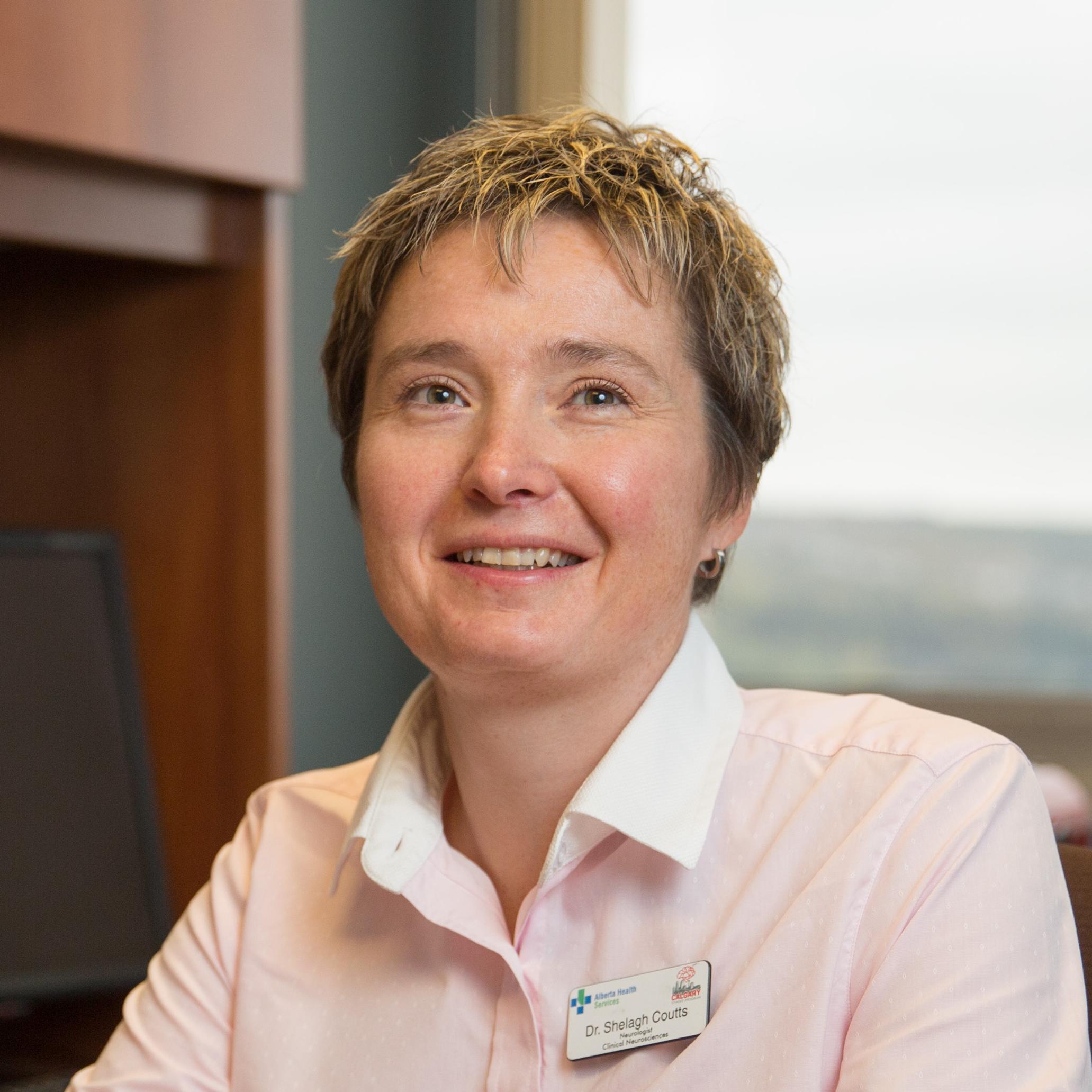
Shelagh Coutts
Professor of Neurology
Dr Shelagh Coutts is Professor of Neurology at The University of Calgary, Department of Clinical Neurosciences. Dr Coutts obtained her Undergraduate Medical Degree from the University of Edinburgh and undertook general medical training at Glasgow Royal Infirmary prior to specialising in neurology. She moved to Calgary to complete a Fellowship in Stroke Neurology with Dr Alastair Buchan and completed her Neurology Residency Training, receiving her FRCPC (Neurology) in 2006.
Her research interests include the use of acute imaging in triage and treatment of stroke and TIA patients in the Emergency Department. She plans to design therapeutic trials in high risk TIA and minor stroke using imaging to identify patients.
Dr Coutts has received a number of awards for her work, including the “Siekert New Investigator Award” from the American Stroke Association, the "Michael J. Pessin award" in stroke leadership from the American Academy…
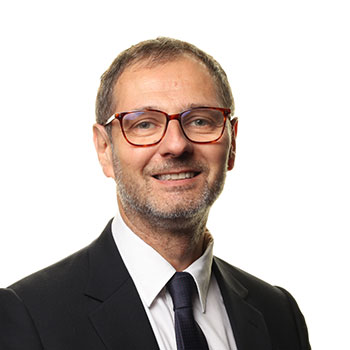
Philippe Gabriel Steg
Interventional Cardiologist
Prof Philippe Gabriel Steg works as an Interventional Cardiologist and is Director of the Coronary Care Unit of Hôpital Bichat, in Paris, France.
Prof Steg’s research interests are in the field of coronary artery disease. He is a former member of the Board of the French Society of Cardiology, an honorary member of the Institut Universitaire de France, and received the silver medal of the European Society of Cardiology in 2011.
Prof Steg led the TAO and EUROMAX trials and is chairing or co-chairing several trials or registries, such as ODYSSEY-CV Outcomes, CLARIFY, THEMIS. Prof Steg has authored more than 650 articles in peer-reviewed international journals. He is a member of the editorial boards for Circulation, Circulation: Cardiovascular Interventions, the European Heart Journal, and the European Heart Journal – Cardiovascular Pharmacotherapy. He is deputy editor for the…





